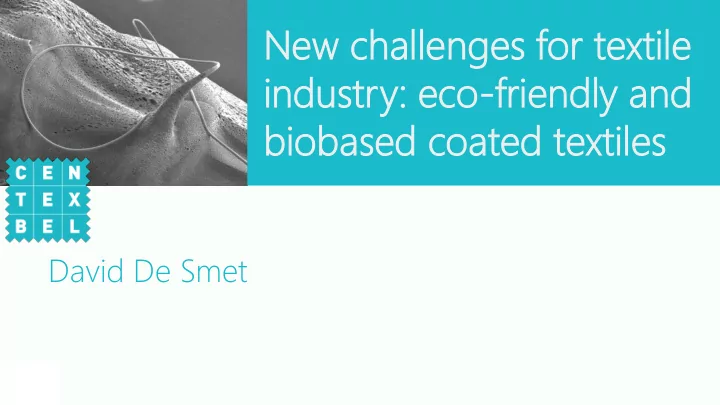

Ne New c w chal alle lenges es fo for tex texti tile le in indu dust stry: y: ec eco-fr frie iendly dly an and d bio iobas ased ed co coat ated ed te text xtil iles es David De Smet
Only a small fraction is for textile coatings
Outline ₋ Introduction ₋ Results ₋ Conclusions and outlook
Outline ₋ Introduction ₋ Results ₋ Conclusions and outlook
Challenge ₋ ECHA limiting use of several chemicals ₋ “Bio, eco, natural and environmentally friendly” consciousness ₋ Roughly 50 years of both oil and natural gas left (BP Statistical Review of World Energy 2016)
Opportunity ₋ Developing eco-friendly and/or biobased solutions ₋ Eco-friendly repellent textiles ₋ 2K biobased PU coating free of solvent ₋ Biobased additives
Outline ₋ Introduction ₋ Results ₋ Conclusions and outlook
Duratex ₋ Ecofriendly water and oil repellent and antimicrobial textile ₋ Transcollaboration ₋ Centexbel (VL) ₋ UCL and Certech (WL) ₋ Ensait and CETI (FR) 8
Fluorfree superhydrophobic finish
Superomniphobic C6 and C8 free formulation Water (10 µl) Olive oil (10 µl) contact/ roll-off angle (°) contact/ roll-off angle (°)
2K Biobased PU coating watercolumn (cm) Coating additive initial washing (20x 40°C) Hydrolysis (70°C, 95% R.H.; 3 weeks) weldable A adhesion promotor ≥1000 ≥1000 ≤10 no B adhesion promotor ≥1000 ≥1000 ≤10 no D adhesion promotor ≥1000 ≥1000 ≤10 no E adhesion promotor ≥1000 ≥1000 ≤10 no F adhesion promotor ≥1000 ≤10 ≥1000 no G adhesion promotor ≥1000 ≤10 ≥1000 no
2K Biobased PU coating ₋ Compatible with additives (not waterbased) ₋ Flexible coating ₋ Not sticky and slip resistant
Bio FR ₋ Development Centexbel-Maes Matress Ticking ₋ Biobased content: 92% ₋ Interzum award 2017
Biobased antimicrobial products ₋ Plant, animal or marine origin ₋ Phenolic, ammonia/amine groups ,… ₋ Efficacy depending on: ₋ Fabric type (chemistry) ₋ Structure of the textile ₋ Fabric weight
Biobased antimicrobial products Staphylococcus aureus Escherichia coli/ Klebsiella pneumoniae Thymol and carvacrol v v Chitosan v v Monolaurin v Tannic acid v Vanillic acid v v Curcumin v v ₋ Thymol and carvacrol and chitosan active at low levels ₋ Biocide regulation!
Biobased antifouling additive ₋ Effective against hard fouling (e.g. barnacles, mussels etc.) Reference 100 80 60 grazing [%] 40 animals [%] 20 0 algae [%] Antifouling coating 100 80 60 grazing [%] 40 animals [%] 20 0 algae [%]
Outline ₋ Introduction ₋ Results ₋ Conclusions and outlook
Conclusions and outlook ₋ Biobased PU’s are promising candidates for renewable textile coatings ₋ Biobased functional additives can be implemented for different applications ₋ FR ₋ Antimicrobial ₋ Antifouling ₋ Abrasion resistance ₋ …
Questions ? dds@centexbel.be +32 9 241 86 84
Acknowledgement The presented results are part of the research projects Biopu funded by Flanders Innovation and Entrepreneurship and part of the research project Duratex financed within the Interreg V program France-Wallonia-Flanders (http://www.interreg- fwvl.eu/nl), a crossborder collaboration program with financial support of the European Fund for Regional Development, and co-financed by the province West Flanders and the Walloon Region.
Recommend
More recommend